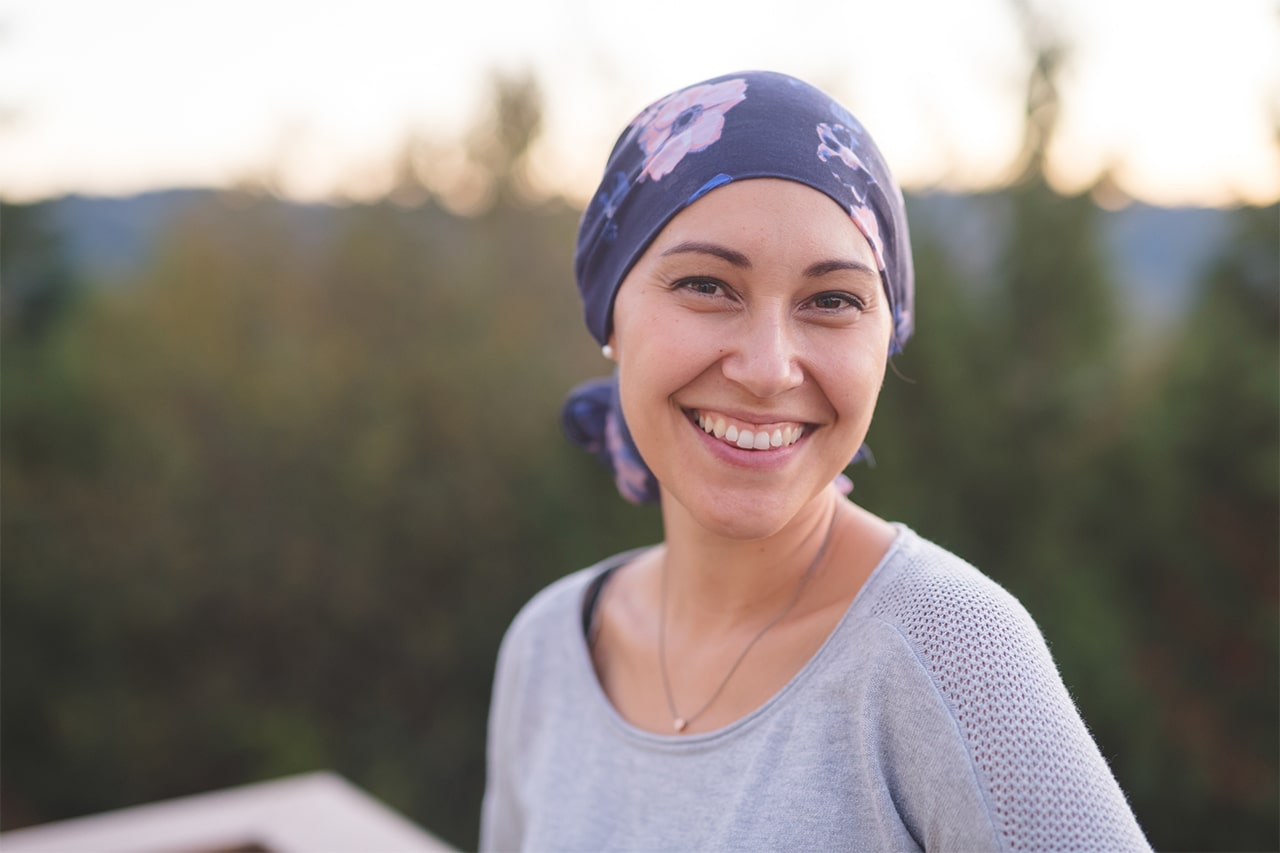- Close
- Back
- For Patients
- For Doctors
Cancer
Cancer is a disease involving the multiplication and spread of cells throughout the body. There are more than 200 types of cancer, each with specific signs and symptoms. Nabilone is sometimes prescribed for the reduction of nausea and vomiting, which often results from radiotherapeutic cancer treatment. There’s also evidence to support the use of medicinal cannabis in the alleviation of associated symptoms such as pain and loss of appetite.


Learn more about conditions
Cancer is a disease in which cells grow uncontrollably within one area and then spread to other parts of the body. It can begin in any area of the body, with abnormal or damaged cells growing and multiplying when they shouldn’t. Such cells might grow into tumours, which may or may not be cancerous. These tumours may be life-threatening, with a particularly high risk associated with those in the brain.
There are five different types of cancer:
- Carcinoma – a cancer that begins in the skin or the tissues that line or cover internal organs. Subtypes include adenocarcinoma, basal cell carcinoma, squamous cell carcinoma and transitional cell carcinoma
- Sarcoma – a cancer that spreads via the connected tissues such as those of the bones, muscles, and cartilage
- Leukaemia – a cancer of the white blood cells. It commonly spreads from blood cell producing tissues, such as that of bone marrow
- Lymphoma and melanoma – cancers known to begin in the cells of the immune system
- Brain and spinal cord cancers – also known as central nervous system cancers
Chemotherapy is regularly used in the treatment of cancer, with chemotherapy-induced nausea and vomiting (CINV) affecting up to 80% of patients. CINV may be categorised as acute, delayed, anticipatory, breakthrough, or refractory.
There are a number of signs associated with the early onset of cancer. People are encouraged to check and consult their GPs on the identification of symptoms such as:
- Changes in bowel habits lasting three weeks or more
- Bloating for three weeks or more
- Unexplained bleeding (this might be noticed after urinating, coughing, or being sick)
- Shortness of breath and chest pain
- Lumps on areas of the body such as the breasts or testicles
- Unexplained weight loss
- Stomach or back pain
Regular cancer screenings are also recommended for the early identification of such symptoms.
Cancer develops as a result of mutations or changes to the DNA make-up of cells. The mutations may be genetically inherited or occur after birth due to environmental factors. The risks are known to be increased as a result of exposure to physical carcinogens (such as radiation and ultraviolet (UV) light), chemical carcinogens (such as cigarette smoke and air pollution), or biological carcinogens (like viruses and bacteria).
Other risk factors include:
- Chemotherapeutic agents (e.g. platinum-based therapies, such as cisplatin)
- Radiation therapy
- Non-chemotherapy medications
- Cancer-related metabolic effects
- Brain or spinal metastases
The surgical removal of tumours is typically the first option to be considered. Courses of chemotherapy might also be prescribed, involving but not limited to medication with 5-HT3 antagonists (e.g. palonosetron); Corticosteroids (e.g. dexamethasone); NK1 receptor antagonists (e.g. aprepitant); Dopamine receptor antagonists (e.g. metoclopramide and prochlorperazine); and Benzodiazepines. Radiotherapy is another choice, involving the controlled use of high-energy X-rays.
The THC medication Nabilone has been available to cancer patients suffering from CINV since the 1990s in instances where first-line treatment options have been found ineffective or unsuitable. There is also evidence also supporting the use of medical cannabis in relieving other cancer-related symptoms, including pain, anxiety and lack of sleep.
Research into the use of medical cannabis as a potential cure for different types of cancer is ongoing, however still at a very early stage, with encouraging preclinical data and some isolated positive case studies being reported, but little else at present.
FAQs about Medical Cannabis


Yes. Cannabis-based medicinal products (CBMPs) have been legal since the 1st of November 2018, when they moved from a Schedule 1 product to a Schedule 2 product. This reflects their potential for medical use.
Cannabis-based medicinal products, also known as CBMPs, can be prescribed by private consultants, when appropriate, within their specialty area when there is unmet clinical need.
In the UK cannabis medicines are accessed primarily via private clinics. However, any specialist physician can prescribe cannabis medicines. GROW® is here to provide education and support to any specialists looking to prescribe or just to find out more.
There are 3 licensed medicines which contain cannabinoids – Epidiolex for some forms of epilepsy, Sativex for multiple sclerosis (MS), and Nabilone for chemotherapy-induced nausea and vomiting (CINV). However, only a handful of prescriptions have been issued in the NHS to date.
Most cannabis-based medicinal products (CBMPs) are instead unlicensed, and they must be written on a private prescription, typically issued by private clinics specialising in medical cannabis treatment.
Cannabis medicines come in multiple forms; flowers, often referred to as herbal cannabis (to be vaporised, rather than smoked), oils (taken under the tongue) and capsules. Cannabis medicines come in high-THC, high-CBD and balanced varieties.
Smoking medical cannabis is illegal. Medical cannabis can instead be taken in different forms depending on the desired speed of onset and duration of action, which is discussed between the patient and their doctor.
It’s important to find a clinic that works for you. Most importantly you need to find a Doctor that specialises in your condition. For example, patients with pain will need to see pain specialist, while those with a mental health condition must see a psychiatrist.
It’s important for patients to know they can use any pharmacy that supplies the appropriate medicines in the UK.
Some clinics have a preferred pharmacy but will be able to send prescriptions to others if needed. If patients have any questions about available medicines, they can contact IPS Pharma.
To speed up the process, patients should bring a copy of their medical records. These are then forwarded to the clinic in advance of the first consultation.
No. Cannabis-based medicinal products (CBMPs) are only prescribed by GMC-registered specialist doctors. As they are medicinal, CBMPs are regulated by the Medicines and Healthcare products Regulatory Agency (MHRA); which ensures the safety, quality, and effectiveness of medicines in the UK.
Over-the-counter (OTC) CBD products can be purchased without a prescription in pharmacies, health food shops, or online. These may come in forms such as oil tinctures, capsules, or vapes. They are not medicinal products as they are regulated by the Food Standards Agency (FSA) as a food supplement, with a 0.3% limit on THC.
Patients are free to seek a second opinion from another clinic. Patients should ensure the clinic has communicated their reasons for deciding not to prescribe. It may be that they feel you should try other medicines before trying cannabis medicines, or that they need to see more information about your medical history before they are happy to prescribe.
For patient enquiries - [email protected]
For doctor enquiries - [email protected]
For all other enquiries – [email protected]
Healthcare professionals can also sign up to our Doctor Portal.


